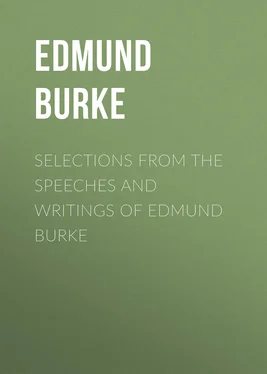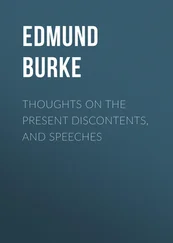Edmund Burke - Selections from the Speeches and Writings of Edmund Burke
Здесь есть возможность читать онлайн «Edmund Burke - Selections from the Speeches and Writings of Edmund Burke» — ознакомительный отрывок электронной книги совершенно бесплатно, а после прочтения отрывка купить полную версию. В некоторых случаях можно слушать аудио, скачать через торрент в формате fb2 и присутствует краткое содержание. Жанр: foreign_prose, История, Политика, literature_19, foreign_edu, foreign_antique, на английском языке. Описание произведения, (предисловие) а так же отзывы посетителей доступны на портале библиотеки ЛибКат.
- Название:Selections from the Speeches and Writings of Edmund Burke
- Автор:
- Жанр:
- Год:неизвестен
- ISBN:нет данных
- Рейтинг книги:4 / 5. Голосов: 1
-
Избранное:Добавить в избранное
- Отзывы:
-
Ваша оценка:
- 80
- 1
- 2
- 3
- 4
- 5
Selections from the Speeches and Writings of Edmund Burke: краткое содержание, описание и аннотация
Предлагаем к чтению аннотацию, описание, краткое содержание или предисловие (зависит от того, что написал сам автор книги «Selections from the Speeches and Writings of Edmund Burke»). Если вы не нашли необходимую информацию о книге — напишите в комментариях, мы постараемся отыскать её.
Selections from the Speeches and Writings of Edmund Burke — читать онлайн ознакомительный отрывок
Ниже представлен текст книги, разбитый по страницам. Система сохранения места последней прочитанной страницы, позволяет с удобством читать онлайн бесплатно книгу «Selections from the Speeches and Writings of Edmund Burke», без необходимости каждый раз заново искать на чём Вы остановились. Поставьте закладку, и сможете в любой момент перейти на страницу, на которой закончили чтение.
Интервал:
Закладка:
DIFFICULTIES OF REFORMERS
Nothing, you know, is more common than for men to wish, and call loudly, too, for a reformation, who, when it arrives, do by no means like the severity of its aspect. Reformation is one of those pieces which must be put at some distance in order to please. Its greatest favourers love it better in the abstract than in the substance. When any old prejudice of their own, or any interest that they value, is touched, they become scrupulous, they become captious, and every man has his separate exception. Some pluck out the black hairs, some the gray; one point must be given up to one; another point must be yielded to another; nothing is suffered to prevail upon its own principle; the whole is so frittered down, and disjointed, that scarcely a trace of the original scheme remains! Thus, between the resistance of power, and the unsystematical process of popularity, the undertaker and the undertaking are both exposed, and the poor reformer is hissed off the stage both by friends and foes.
PHILOSOPHY OF COMMERCE
If honesty be true policy with regard to the transient interest of individuals, it is much more certainly so with regard to the permanent interests of communities. I know, that it is but too natural for us to see our own CERTAIN ruin in the POSSIBLE prosperity of other people. It is hard to persuade us, that everything which is GOT by another is not TAKEN from ourselves. But it is fit that we should get the better of these suggestions, which come from what is not the best and soundest part of our nature, and that we should form to ourselves a way of thinking, more rational, more just, and more religious. Trade is not a limited thing; as if the objects of mutual demand and consumption could not stretch beyond the bounds of our jealousies. God has given the earth to the children of men, and he has undoubtedly, in giving it to them, given them what is abundantly sufficient for all their exigencies; not a scanty, but a most liberal, provision for them all. The author of our nature has written it strongly in that nature, and has promulgated the same law in his written word, that man shall eat his bread by his labour; and I am persuaded, that no man, and no combination of men, for their own ideas of their particular profit, can, without great impiety, undertake to say, that he SHALL NOT do so; that they have no sort of right, either to prevent the labour, or to withhold the bread.
THEORIZING POLITICIANS
There are people who have split and anatomised the doctrine of free government, as if it were an abstract question concerning metaphysical liberty and necessity; and not a matter of moral prudence and natural feeling. They have disputed, whether liberty be a positive or a negative idea; whether it does not consist in being governed by laws, without considering what are the laws, or who are the makers; whether man has any rights by nature; and whether all the property he enjoys be not the alms of his government, and his life itself their favour and indulgence. Others corrupting religion, as these have perverted philosophy, contend, that Christians are redeemed into captivity; and the blood of the Saviour of mankind has been shed to make them the slaves of a few proud and insolent sinners. These shocking extremes provoking to extremes of another kind, speculations are let loose as destructive to all authority, as the former are to all freedom; and every government is called tyranny and usurpation which is not formed on their fancies. In this manner the stirrers-up of this contention, not satisfied with distracting our dependencies and filling them with blood and slaughter, are corrupting our understandings; they are endeavouring to tear up, along with practical liberty, all the foundations of human society, all equity and justice, religion and order.
ECONOMY AND PUBLIC SPIRIT
Economy and public spirit have made a beneficent and an honest spoil; they have plundered from extravagance and luxury, for the use of substantial service, a revenue of near four hundred thousand pounds. The reform of the finances, joined to this reform of the court, gives to the public nine hundred thousand pounds a year and upwards.
The minister who does these things is a great man—but the king who desires that they should be done is a far greater. We must do justice to our enemies—these are the acts of a patriot king. I am not in dread of the vast armies of France; I am not in dread of the gallant spirit of its brave and numerous nobility; I am not alarmed even at the great navy which has been so miraculously created. All these things Louis the Fourteenth had before. With all these things, the French monarchy has more than once fallen prostrate at the feet of the public faith of Great Britain. It was the want of public credit which disabled France from recovering after her defeats, or recovering even from her victories and triumphs. It was a prodigal court, it was an ill-ordered revenue, that sapped the foundations of all her greatness. Credit cannot exist under the arm of necessity. Necessity strikes at credit, I allow, with a heavier and quicker blow under an arbitrary monarchy, than under a limited and balanced government; but still necessity and credit are natural enemies, and cannot be long reconciled in any situation. From necessity and corruption, a free state may lose the spirit of that complex constitution which is the foundation of confidence.
REFORM OUGHT TO BE PROGRESSIVE
Whenever we improve, it is right to leave room for a further improvement. It is right to consider, to look about us, to examine the effect of what we have done. Then we can proceed with confidence, because we can proceed with intelligence. Whereas in hot reformations, in what men, more zealous than considerate, call MAKING CLEAR WORK, the whole is generally so crude, so harsh, so indigested; mixed with so much imprudence, and so much injustice; so contrary to the whole course of human nature and human institutions, that the very people who are most eager for it are among the first to grow disgusted at what they have done. Then some part of the abdicated grievance is recalled from its exile in order to become a corrective of the correction. Then the abuse assumes all the credit and popularity of a reform. The very idea of purity and disinterestedness in politics falls into disrepute, and is considered as a vision of hot and inexperienced men; and thus disorders become incurable, not by the virulence of their own quality, but by the unapt and violent nature of the remedies. A great part, therefore, of my idea of reform is meant to operate gradually; some benefits will come at a nearer, some at a more remote period. We must no more make haste to be rich by parsimony, than by intemperate acquisition.
CIVIL FREEDOM
Civil freedom, gentlemen, is not, as many have endeavoured to persuade you, a thing that lies hid in the depth of abstruse science. It is a blessing and a benefit, not an abstract speculation; and all the just reasoning that can be upon it is of so coarse a texture, as perfectly to suit the ordinary capacities of those who are to enjoy, and of those who are to defend it. Far from any resemblance to those propositions in geometry and metaphysics, which admit no medium, but must be true or false in all their latitude; social and civil freedom, like all other things in common life, are variously mixed and modified, enjoyed in very different degrees, and shaped into an infinite diversity of forms, according to the temper and circumstances of every community. The EXTREME of liberty (which is its abstract perfection, but its real fault) obtains nowhere, nor ought to obtain anywhere. Because extremes, as we all know, in every point which relates either to our duties or satisfactions in life, are destructive both to virtue and enjoyment.
Читать дальшеИнтервал:
Закладка:
Похожие книги на «Selections from the Speeches and Writings of Edmund Burke»
Представляем Вашему вниманию похожие книги на «Selections from the Speeches and Writings of Edmund Burke» списком для выбора. Мы отобрали схожую по названию и смыслу литературу в надежде предоставить читателям больше вариантов отыскать новые, интересные, ещё непрочитанные произведения.
Обсуждение, отзывы о книге «Selections from the Speeches and Writings of Edmund Burke» и просто собственные мнения читателей. Оставьте ваши комментарии, напишите, что Вы думаете о произведении, его смысле или главных героях. Укажите что конкретно понравилось, а что нет, и почему Вы так считаете.












